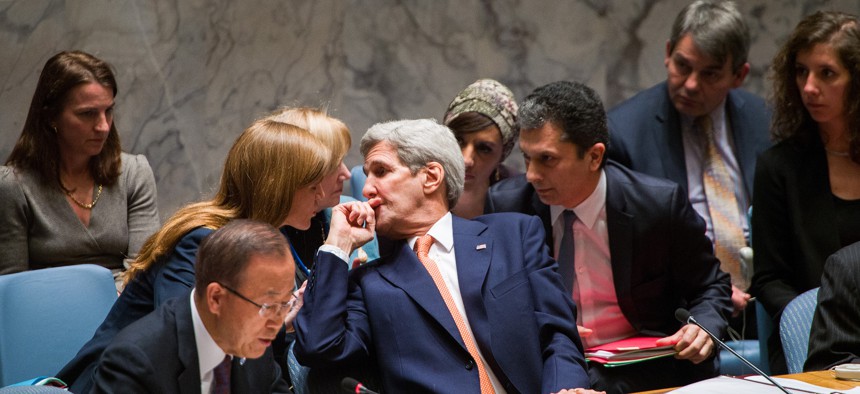
Secretary of State John Kerry speaks with the U.S. Ambassador to the UN, Samantha Power, during the UN Security Council meeting on Syria on Dec. 18. State Department
U.S. Syria Policy Shifts From ‘Assad Must Go’ to ‘Not Right Now’
The UN Security Council backs a blueprint for Syrian peace talks — and papers over powderkeg tensions between the U.S. and Russia.
NEW YORK — Even as Secretary of State John Kerry heralded a fresh U.N. Security Council resolution aimed to end the nearly-five-year civil war in Syria, he grimly acknowledged the U.S. has scaled back its demands of “Assad must go” to “just not right now.”
“We’re not kicking it down the road at all,” said Kerry, seated next to Russian Foreign Minister Sergey Lavrov at a press conference at the U.N. following the vote. But he continued, “We began to really come to the reality that this demand was in fact prolonging the war, creating greater agony and suffering, and not getting us anywhere but in a stalemate. And so it was important not to put this cart before the horse and require a determination about a penultimate issue before you begin to get to the table.”
The resolution backs a framework of a ceasefire, talks between the government of Syrian strongman Bashar al Assad and opposition groups that have been fighting to topple it since early 2011, and an approximately two-year timeline for elections. The talks will likely begin in the latter half of January, and the first six months would be a transition period, with elections held roughly a year after, Kerry said Friday.
It is an achievement for the dogged Secretary of State to get China and Russia onboard with any Security Council resolution. Still, the text doesn’t address Assad’s future, and the ceasefire wouldn’t apply to the Islamic State or al Nusra, the only two groups the members could agree would be excluded from talks, amid heated disagreement. That guest list for the talks has yet to be finalized.
Kerry’s comments also seemed to put him somewhat at odds with President Obama, who earlier in the day at his end-of-the-year press conference, said he’d long argued over Assad with Russian President Vladimir Putin. “His suggestion — as I gather some Republicans are now suggesting — was Assad is not so bad, let him just be as brutal and repressive as he can, but at least he’ll keep order,” Obama said. “I said, look, the problem is that the history of trying to keep order when a large majority of the country has turned against you is not good. And five years later, I was right...I think that Assad is going to have to leave in order for the country to stop the bloodletting and for all the parties involved to be able to move forward in a non-sectarian way.”
By Kerry’s articulation, a pragmatic assessment of the status quo has forced the Obama administration to shift toward Moscow’s position: that requiring Assad’s removal as a starting point for negotiations puts undue preconditions on peace talks. And after all, the blueprint’s long-term success is dependent on Russia’s backing as much as it is on U.S. leadership. Yet tensions in that relationship, exacerbated by Russia’s military entry into Syria in September, persistently threaten to unravel it.
These tensions between Kerry and Lavrov were apparent even as they announced the resolution.
“We hear what our colleagues are telling us. Let’s start political process so that those who want to oust Assad get some hope that they might achieve this result. And then they’re saying we’ll be able to coordinate with you our fight against terrorism,” Lavrov said, bristling at top U.S. military officials’ continued refusal to regularly communicate or coordinate the counter-ISIS fight with their Russian counterparts. “It is very sad that once again our common task – and that is putting an end to terrorists – is becoming a hostage to one personality.”
State Department spokesman John Kirby began, “That concludes the press conference. Thank you all very –” and then Kerry interrupted.
“I don’t want to open up … some issues that we’re trying to work through,” he said. “But if 80 percent [of strikes] are hitting opposition rather than hitting Daesh, it’s a challenge. And we’re trying to resolve that so that we can cooperate.”
Lavrov responded, “The proposal to coordinate on this remains on the table for the two and a half months now.”
Kerry turned to him with a grin and a handshake to break the tension, saying, “And that’s why we’re going to do it.” For a moment even as Kerry gripped his hand, Lavrov remained stony-faced. Then he smiled, and the conference ended.







